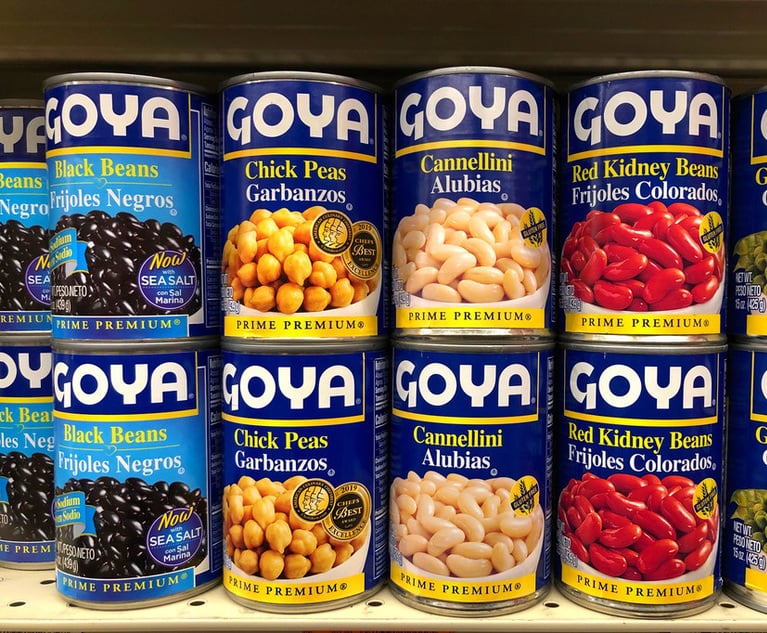 U.S. Department of Justice building in Washington, D.C./Photo: Diego M. Radzinschi/ALM
U.S. Department of Justice building in Washington, D.C./Photo: Diego M. Radzinschi/ALMWhat to Make About the Justice Department's Most Recent 'No-Poach' Settlement
Management-side and antitrust lawyers are looking for enforcement clues about how the U.S. Justice Department will approach no-poach agreements between companies.
April 25, 2018 at 05:05 PM
4 minute read
Management-side lawyers and antitrust specialists are parsing a recent U.S. Justice Department settlement targeting a “no poach” deal that restricted employee recruitment between two companies, one new sign the Trump administration isn't shying from enforcement in this area.
The Justice Department in April settled a complaint against rail equipment suppliers Knorr-Bremse AG and Westinghouse Air Brake Technologies Corp. In the lawsuit, the government had alleged the companies unlawfully agreed for years not to compete for the other's employees.
The DOJ has warned since October 2016, in new guidance for human resources professionals, that companies and individuals could face criminal charges for no-poach agreements, but the government did not file any such charges in this case. Makan Delrahim, the department's antitrust chief, suggested in January that the first criminal charges were imminent.
No-poach agreements, common in many industries, can unlawfully eliminate competition, limiting the mobility of employees and their access to information. Employment attorneys say these agreements are often found in the tech industry.
Law firms and companies took notice of the Justice Department's settlement with Knorr-Bremse and Westinghouse, the first enforcement action under the Trump administration in this area of antitrust law.
Mark Krotoski, an antitrust partner at Morgan, Lewis & Bockius in Palo Alto, California, said he is helping a number of clients comply with the Justice Department's guidance on no-poach agreements. Enforcement actions should push companies to take a closer look at their policies and avoid any “back door” or official agreements between companies, Krotoski said.
The October 2016 announcement from the Justice Department about potential criminal exposure for no-poach agreements was “a significant development and it set the foundation for what we are seeing now,” Krotoski said. “This can happen in any industry—wherever there is a specialized skill with high demand.”
In the case against Knorr-Bremse AG and Westinghouse, the government said “the unlawful no-poach agreements challenged restrained competition for employees and deprived rail industry workers of important opportunities, information, and the ability to obtain better terms of employment.”
Mark Hamer, chairman of Baker McKenzie's North America antitrust practice, represented Knorr-Bremse. Craig Waldman, co-chairman of Jones Day's antitrust practice, represented Westinghouse. Neither could be reached for comment about the settlement, filed in April in U.S. District Court for the District of Columbia.
Although the allegations concern agreements between high-level corporate officials, employers should take steps to ensure all managers, recruiters and human resources professionals comply with antitrust laws, Daniel Green, an associate at Epstein Becker & Green in New York said in a recent blog post.
“For example, seemingly innocuous activities like discussing employee salary and benefits at industry conferences can constitute an unlawful information exchange,” Green wrote. “Employers will be well served to take additional steps to audit their business practices and communications with competitors throughout the organization in order to detect, and mitigate any legal risk associated with potentially unlawful agreements with competitors.”
Dionne Lomax, an antitrust attorney at Mintz, Levin, Cohn, Ferris, Glovsky and Popeo said in a recent blog post that not all business arrangements involving employee solicitation and recruitment are unlawful.
Agreements reached in the context of a legitimate business transaction or collaboration could be viewed as necessary to achieve the purpose of the transaction, Lomax said. These exceptions include mergers or acquisitions, contracts with consultants and in the settlement of legal disputes.
“The DOJ is vigilant regarding its enforcement of no-poach agreements and will undoubtedly bring criminal charges to resolve similar conduct going forward,” Lomax wrote.
This content has been archived. It is available through our partners, LexisNexis® and Bloomberg Law.
To view this content, please continue to their sites.
Not a Lexis Subscriber?
Subscribe Now
Not a Bloomberg Law Subscriber?
Subscribe Now
NOT FOR REPRINT
© 2025 ALM Global, LLC, All Rights Reserved. Request academic re-use from www.copyright.com. All other uses, submit a request to [email protected]. For more information visit Asset & Logo Licensing.
You Might Like
View All

NLRB Blisters Skilled Care Home Chain That Terminated Nursing Assistant Who Complained About Wages
6 minute read
Ex-Six Flags CLO Lands New C-Suite Post—This Time as HR Chief
Trending Stories
- 1The Appropriate Exemption in Students for Fair Admissions v. President & Fellows of Harvard College
- 2DOJ, 10 State AGs File Amended Antitrust Complaint Against RealPage and Big Landlords
- 3New Partners at Cummings & Lockwood, Carmody Torrance Sandak & Hennessey
- 4'Extra Government'?: NY Top Court Eyes Ethics Commission's Constitutionality
- 5South Texas College of Law Houston Selects New Dean
Who Got The Work
Michael G. Bongiorno, Andrew Scott Dulberg and Elizabeth E. Driscoll from Wilmer Cutler Pickering Hale and Dorr have stepped in to represent Symbotic Inc., an A.I.-enabled technology platform that focuses on increasing supply chain efficiency, and other defendants in a pending shareholder derivative lawsuit. The case, filed Oct. 2 in Massachusetts District Court by the Brown Law Firm on behalf of Stephen Austen, accuses certain officers and directors of misleading investors in regard to Symbotic's potential for margin growth by failing to disclose that the company was not equipped to timely deploy its systems or manage expenses through project delays. The case, assigned to U.S. District Judge Nathaniel M. Gorton, is 1:24-cv-12522, Austen v. Cohen et al.
Who Got The Work
Edmund Polubinski and Marie Killmond of Davis Polk & Wardwell have entered appearances for data platform software development company MongoDB and other defendants in a pending shareholder derivative lawsuit. The action, filed Oct. 7 in New York Southern District Court by the Brown Law Firm, accuses the company's directors and/or officers of falsely expressing confidence in the company’s restructuring of its sales incentive plan and downplaying the severity of decreases in its upfront commitments. The case is 1:24-cv-07594, Roy v. Ittycheria et al.
Who Got The Work
Amy O. Bruchs and Kurt F. Ellison of Michael Best & Friedrich have entered appearances for Epic Systems Corp. in a pending employment discrimination lawsuit. The suit was filed Sept. 7 in Wisconsin Western District Court by Levine Eisberner LLC and Siri & Glimstad on behalf of a project manager who claims that he was wrongfully terminated after applying for a religious exemption to the defendant's COVID-19 vaccine mandate. The case, assigned to U.S. Magistrate Judge Anita Marie Boor, is 3:24-cv-00630, Secker, Nathan v. Epic Systems Corporation.
Who Got The Work
David X. Sullivan, Thomas J. Finn and Gregory A. Hall from McCarter & English have entered appearances for Sunrun Installation Services in a pending civil rights lawsuit. The complaint was filed Sept. 4 in Connecticut District Court by attorney Robert M. Berke on behalf of former employee George Edward Steins, who was arrested and charged with employing an unregistered home improvement salesperson. The complaint alleges that had Sunrun informed the Connecticut Department of Consumer Protection that the plaintiff's employment had ended in 2017 and that he no longer held Sunrun's home improvement contractor license, he would not have been hit with charges, which were dismissed in May 2024. The case, assigned to U.S. District Judge Jeffrey A. Meyer, is 3:24-cv-01423, Steins v. Sunrun, Inc. et al.
Who Got The Work
Greenberg Traurig shareholder Joshua L. Raskin has entered an appearance for boohoo.com UK Ltd. in a pending patent infringement lawsuit. The suit, filed Sept. 3 in Texas Eastern District Court by Rozier Hardt McDonough on behalf of Alto Dynamics, asserts five patents related to an online shopping platform. The case, assigned to U.S. District Judge Rodney Gilstrap, is 2:24-cv-00719, Alto Dynamics, LLC v. boohoo.com UK Limited.
Featured Firms
Law Offices of Gary Martin Hays & Associates, P.C.
(470) 294-1674
Law Offices of Mark E. Salomone
(857) 444-6468
Smith & Hassler
(713) 739-1250







